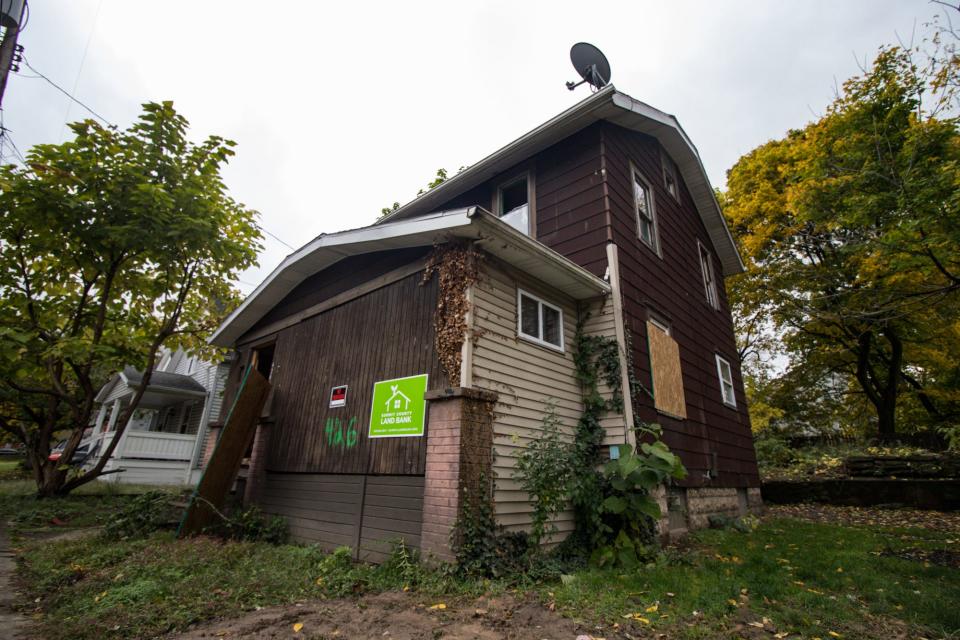Why is it so hard to crack down on some landlords who won't make repairs or pay taxes?

Five years after Ohio's first coordinated foreclosure against a tax-delinquent landlord, Gary Thomas is still buying, selling and renting homes in Akron – and not paying all his property taxes or maintaining units while evicting tenants.
Summit County Fiscal Officer Kristen Scalise pushed dozens of Thomas' tax-delinquent properties into sheriff’s sales in 2018 when she took the unprecedented step of labeling the Wadsworth businessman a "slumlord." At the time, he owed more than $1 million in back taxes – about 10% of all late property taxes in the city of Akron.
With coordination from the Summit County Land Bank, the enforcement action pinched a business model that thrives on not paying taxes, leaving in its wake dozens of vacant lots where rundown homes were bulldozed on taxpayers' dime.
"It's not illegal to not pay your taxes," Thomas told the Beacon Journal five years ago.
Thomas is no longer speaking to the Beacon Journal. But after selling troubled assets to out-of-town investors in deals that keep him on as the local landlord, his business endures.
Local officials tasked with holding him and other problem landlords accountable are learning from the experience as they aim to ramp up enforcement in early 2024.
“As a result of our delinquent landlord initiative, we have gained additional knowledge as to certain business models used to circumvent taxation,” Scalise said.
But the county will need help from lawmakers if it hopes to go after the same landlord, or others like him, and get better results.
Local officials ask Ohio lawmakers for 2 fixes
Gary Thomas and his son Ross control about a third of the rental units the father owned in 2018. There could be dozens more under their management, according to city housing inspectors who chase down open code violations.
Ross Thomas maintains he has no involvement in his father’s dealings even though the men share tax mailing addresses and investors and collect rent at some of the same properties.
The city and county agencies, which maintain separate rental registries, use different codes and track different aspects of property ownership in the rental market, making it difficult for researchers to combine their findings.
Today, despite years of targeted enforcement, properties reportedly owned or managed by Gary Thomas and his companies now owe at least $164,428.55 — the largest back-tax bill by any single landlord in the Greater Akron rental market, according to analyses of property records by the Beacon Journal.
But Thomas and others on the county's tax delinquent registry continue to buy and transfer property without settling their public debts.
“In speaking with other elected officials throughout the state, I believe it would be beneficial to pursue a legislative fix that would prevent delinquent property owners from acquiring additional properties," Scalise said.
She and her staff worry about alerting individual landlords to what’s coming as they ramp up enforcement in early 2024 after years of declining foreclosure cases filed in coordination with the Summit County Land Bank.
The land bank's special foreclosure filings on tax-delinquent property owners are down about 40%. Filings are on pace to finish at 160 this year compared to 258 in 2018 and 271 in 2019, when activity surged amid the mass foreclosure case against Gary Thomas.
It's not just the pandemic that's slowed enforcement. The U.S. Supreme Court dealt land banks a defeat in May with a unanimous ruling in Tyler v. Hennepin County, in which a Minnesota woman argued that the government took more than her back tax bill when it pushed her home into foreclosure. The high court agreed that government had violated the "Takings Clause" of the Fifth Amendment of the U.S. Constitution, which prohibits the government seizure of private property "without just compensation."
The Summit County Land Bank, like the Fiscal Office, is looking to the Ohio General Assembly to enact a law that will allow it to continue to go after landlords who don't pay taxes without fear that monies collected at sheriff's sale are clawed back by litigious property owners.
Who is Gary Thomas and what’s his business?
Gary Thomas, 68, has managed single-family rental homes for more than three decades, primarily in lower income neighborhoods in Akron. He also keeps a couple rental units in Barberton.
He buys and sells his properties from other landlords and investors. But a significant chunk of his assets are formerly bank-foreclosed homes he bought at public auction.
Thomas owns and manages units in unstable housing markets. He and his son have no documented business, for example, in Northwest Akron, Wallhaven or Merriman Valley, but they do have seven properties in Kenmore, eight in North Hill, 10 in South Akron and 16 in East Akron, including a third of their properties with city repair orders.
Tenants routinely ask not to be named out of fear that speaking up would make it even harder to get their landlord to make repairs or, because they’re on verbal or month-to-month rental agreements, get them evicted. A woman who opened the door in East Akron, in a unit with active housing code violations, said she thinks there’s black mold growing inside. A man in Goodyear Heights said Thomas dismisses his requests as “cosmetic repairs.”
More: Tenant hits ‘slumlord’ in the pocketbook
Neighbors on Grifton Avenue in Goodyear Heights were the only tenants to speak positively of Thomas.
“If you’re looking for dirt, you’re not going to find anything here,” a man said in a short phone call after returning a message a reporter left on his doorbell camera. The man said he used to work maintenance for Thomas and is happy to fix anything.
His neighbor also does his own repairs. He has to because he’s on a rent-to-own contract, which means Thomas owns the home until a certain number of rent payments are made. Rent-to-own contracts relieve landlords of maintenance obligations and can be canceled if the buyer misses a single payment.
The Summit County Fiscal Office and former tenants said Thomas has a history of not honoring or recording rent-to-own agreements, also known as land contracts. There’s legal consensus that written agreements are best practice.
“Renting your property without putting the rules and expectations of the tenancy in writing is an invitation for trouble,” writes attorney Ann O’Connell, a legal editor at Nolo, a publisher specializing in landlord-tenant and real estate law.

Landlord was on city's radar for years
The nature of Gary Thomas’ dealings publicly surfaced in early 2017 after two men, including a bouncer who died, were shot at Game 7 Bar and Grille on Arlington Street, which Thomas owned and rented.
Police dodged bottles and punches while trying to break up a brawl at the property on another occasion. City Council went after the liquor permit. And county tax collectors went after the owner.
For six years, though, the city had been taking Thomas to court over housing violations, collecting thousands in fines and ordering several of his properties to be demolished.
Thomas used 25 companies, at the time, to strategically own 222 properties. The limited liability companies — each linked to one of two business addresses in Akron — allowed Thomas to keep properties with back taxes, defaulting mortgages and housing code violations from jeopardizing his entire business.
“I’ve got several other properties — some I pay taxes on, some I don’t,” Thomas said in 2018, explaining that he'd rather invest his money and pay 18% penalties to third-party debt collectors than pay taxes when they're due.
Summit County pushes 69 of Gary Thomas' tax-delinquent properties into foreclosure
In 2018, the Summit County Fiscal Office and Land Bank pushed 69 of Gary Thomas' tax delinquent properties into foreclosure. Thomas filed for bankruptcy protection, which bought time to sell assets he otherwise would have lost or been forced to redeem at sheriff’s sale.

Because he failed to insure his properties, U.S. Bankruptcy Judge Alan M. Koschik eventually denied the bankruptcy protection that would have shielded 27 of his properties from foreclosure.
One by one, Thomas either outbid the land bank or watched others buy his troubled properties at sheriff’s sales. If no one bid at two auctions, the land bank assumed the title, often on properties too far gone for anyone, including Thomas, to want.
The Summit County Land Bank still owns 24 of the properties. At the time, they were all run-down houses or empty lots with delinquent tax bills greater than their market value or the cost to fix them up.
As a quasi-public redevelopment agency whose board members are elected officials, like Scalise, the land bank erased the delinquent tax bills on the auctioned properties so future developers or neighbors would take them. The homes on each of these properties were torn down with state, local and federal tax dollars. The bills for the taxpayer-funded demolitions, which typically run between $5,000 and $10,000, were added to the property tax bill and forgiven.

The land bank helped some tenants buy property the government wrested from Thomas, at a steeply discounted price. And Thomas still owns the bar on South Arlington, which is up for sale.
Thomas sells assets, avoids some enforcement actions
In unsuccessfully requesting bankruptcy protection, court records showed how rental income enriched the tax-free investments of Gary Thomas's personal retirement account.
And he found buyers to take his tax-delinquent assets before the government could seize them.
Court records show that Gary L. Thomas Roth LLC deposited $20,000 into Thomas’ personal retirement account in the year of targeted enforcement before the bankruptcy case. Another company put that exact amount in a bank account for another real estate company, Capital Funding, which Thomas uses today for at least two rental properties.
Despite still earning rental income, the aggressive collection of back taxes forced Thomas to deal with his public debt.
At the beginning of 2018 as the county enforcement action took root, nine of Thomas' properties had a combined $31,324 back-tax bill. The retirement account of Jeffrey and Socorro Magaziner, a California couple, paid Gary and Ross Thomas $624,000 for the properties between July and October of 2019.
IRA Services Trust Company, which was acquired by Forge Trust in 2019, facilitated the deal for the California couple, who can defer taxes on future rental income as an investment. A representative for Forge Trust called her company a “passive bookkeeper,” meaning the company handles financial transactions (rental income deposits and checks going out) for self-directed IRA accounts. But Forge Trust, like others in the business of helping retirees diversify their nest eggs, doesn’t monitor whether clients have knowledge of the lease agreements, property conditions or daily management of rental units they hire landlord like Ross and Gary Thomas to oversee at the local level.
It’s that arrangement that caught the inquisitive eye of tenant Candy Lauderdale after Ross Thomas filed an eviction on behalf of Jeffrey Magaziner, whom she’d never heard of before. Lauderdale called Magaziner, who would not return a phone call from the Beacon Journal. She said the owner expressed no knowledge of the lease agreement she demanded from Ross Thomas or that his father, Gary, was trying to collect her rent.
“Little by little, stuff wasn’t adding up right. It was just one thing after another,” Lauderdale said.
What remains of Gary Thomas and his business
Using property, court and state business records, the Beacon Journal has tracked 198 rental properties owned by Gary Thomas, his family and his businesses since 2017.
Gary and Ross Thomas continue to own or manage 87 of the properties. The city lists even more under their management, but Ross Thomas has said he has nothing to do with some of these properties when contacted by inspectors whose notes also say attempts to reach Gary Thomas often end with a voicemail message.
As of July, the tax bills were late on 45% of the 81 properties owned or managed by Gary Thomas. He was behind $164,428.55, according to county records.
Properties managed by Ross Thomas, who recently paid a back-tax bill the day he posted an eviction notice, appear to be current on their taxes.
What inspection reports say about the properties
The Akron Department of Neighborhood Assistance at City Hall has unresolved code violations for 17 properties owned or managed by Gary or Ross Thomas.
In almost every case, the father and son have failed to hit the city's deadlines. Extensions are granted. Some cases have been active for years.
The city's rental registry and housing code violations indicate that Gary Thomas owns 54 rentals and manages 22 more. Of those, 15 have unresolved housing violations. The Beacon Journal has seen conditions that would qualify as code violations — open windows in unsecured vacant homes, missing vent covers, crumbling walls in a stairwell or over a kitchen sink, a window that won't stay open and a front door that's falling apart — at properties not on the city's list.
Ross Thomas owns five rentals and manages 27. Of these 33, three have unresolved code violations. The father and son also share management of two units.
The city reports document the challenging efforts of inspectors to get to the bottom of who owns and manages some of the properties, and who’s ultimately responsible for their upkeep.
After not fully complying with repair orders within 30 days, Ross and Gary Thomas have been given multiple extensions and, in cases where they continually fail to meet the orders, fined $100 to $500.
At a three-story home with a detached garage on Fairbanks Place in Akron's Middlebury neighborhood, inspectors have been monitoring issues first documented in May 2022. Eight remaining repairs orders — missing downspouts and an overhead garage door, a meter that needs replaced, windows in the basement and storm door that need fixed, and more — must be completed by Nov. 30, or the city will take its most drastic measures allowed under the law. Gary Thomas would be fined $1,000, and all properties he owns or manages in the city will be inspected twice a year for the next four years.
Reach reporter Doug Livingston at dlivingston@thebeaconjournal.com or 330-996-3792.
This article originally appeared on Akron Beacon Journal: Landlord Gary Thomas again has largest back tax bill in Greater Akron

